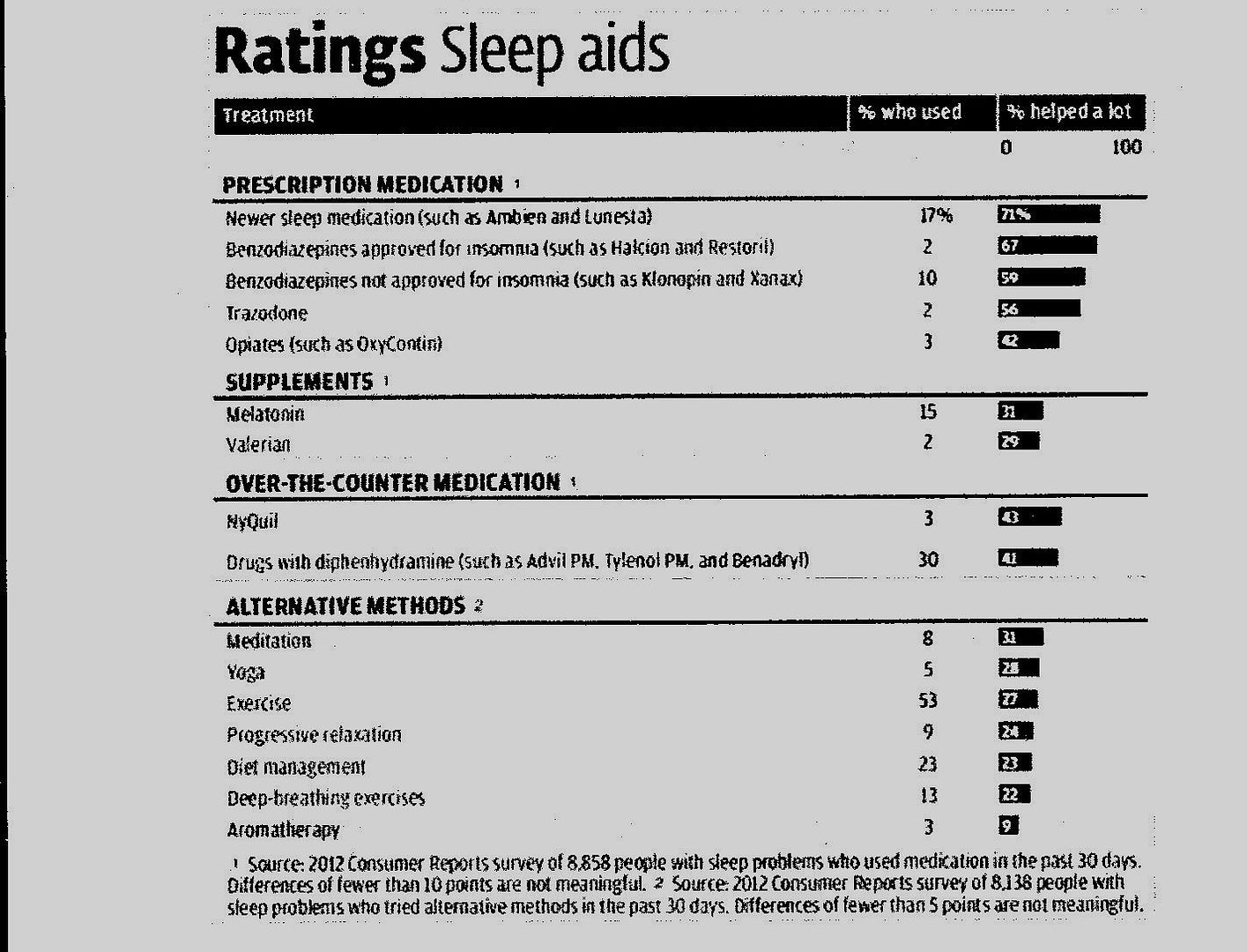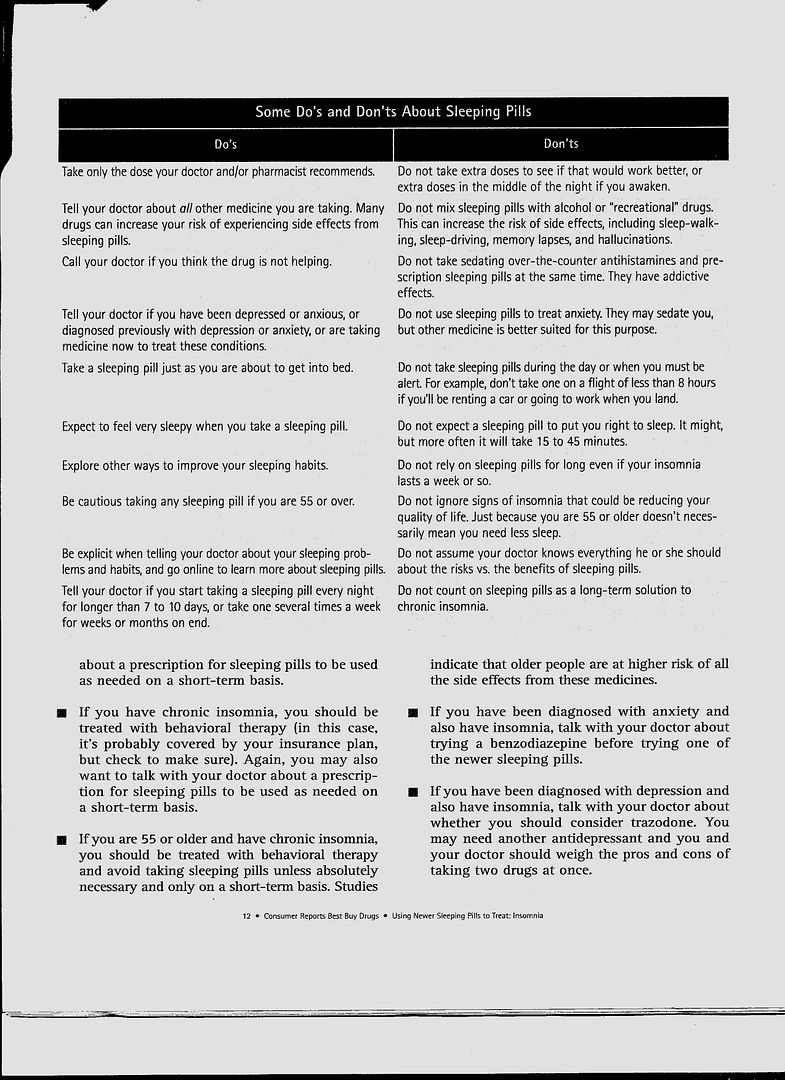Going back to my old auto range last night and taking the Ambien did lead to fewer wakes (4 or 5 instead of about 10), and much, much less aerophagia. The AHI was only 2.1, which is a bit less than it's been running in Auto mode recently, but twice as high as what I was getting in fixed BiPAP mode. And I while I was in bed for only 5.5 hours, I think I was actually asleep for 4.8 or 4.9 hours, for a sleep efficiency of about 88% (as compared to getting 5.5 hours of fractured sleep in a 7.1 time-in-bed period the night before, for a sleep efficiency of about 78%). There's Ambien hangover to deal with, but today it's not too bad.
Country4ever wrote:I'm not sure what your settings are, but I woke up all night long on the autopap settings. I changed it to straight cpap, and would sleep so much better, and uninterrupted.
This idea was what lead to me deciding to try fixed pressures for a few days. I had hoped that the fixed pressures might lead to both a lower AHI and a bit more sleep continuity without too much of an increase in the areophagia. But,
for me, the experiment failed because my stomach could not handle the low fixed pressures of 8/5 while awake, and hence I had to use the ramp, and I suspect the small, but steady increase in pressure during the ramp was enough when I was awake to cause additional wakefulness rather than allowing me to get to sleep more readily.
However in the past year (I've been on cpap for 7 years), I started waking up alot during the night again. I wonder if that's "normal" for aging?
I have alpha wave intrusion.......which means just as you're reaching a lower stage of sleep, your brain wakes you up. There's a med for this, but I don't think it has good results. My doc really didn't want to put me on it.
Some increase in wakefulness during sleep is age related; some of that age related increase is probably due to things like your alpha wave intrusions, which can be caused by things like pain.
In my case I believe that I do NOT have unreasonable expectations about what my sleep can or should be like. The conversations with my sleep doc seem to confirm this. I do not expect to eliminate all middle-of-the-night wakes. And I do not expect to suddenly increase the amount of sleep I actually get to 8 "solid" hours.
My goals are much less lofty, but much more realistic: I know that if the number of wakes is limited to 2-4 post-REM wakes and if the longest wake is 10 minutes or so and if I get 6.5-7 hours of sleep in a 7-7.5 hour time-in-bed window (i.e. my sleep efficency is at least 90%), and the AHI < 2.5 or so, then I'll feel and function pretty good all day long.
But right now? There are too many wakes for them to all be post-REM, too many of the wakes are 10 minutes or longer, my total sleep is less than 6 hours too much of the time, my sleep efficiency is less than 90% too much of the time, and the AHI is > 3 much more than it used to be. Any one of these things can adversely affect how I feel and function; and when lots of them happen all at the same time, I start to feel pretty bad pretty quickly.
Also.........never eat in the evening. When your GI tract is awake............so is your brain.
Eating supper late is occasionally an issue, but I've learned to watch both what and when I eat relative to my extremely late bedtime. On the days where I was attempting my fixed BiPAP pressures experiement, I made sure that supper was early enough and light enough to not be a potential aerophagia trigger. But the aerophagia still returned with a vengence.
[qyuote]How's your pain at night? I have leg pain, and sleep so much better if I take acetaminophen before bed.[/quote]Pain from injuries
was a factor is aggravating the most recent round of insomnia back in October and November---it may even have been a significant trigger. In late October while out on one of my 3.5 miles walks, I fell hard enough to skin both knees and elbows, and landed mainly on my left knee twisting it slightly. After limping home the left knee was hurting pretty bad. I continued favoring the knee, but like a fool, I didn't go in to the doc's to have it checked out (it was NOT as painful as the MCL injury to the right knee back in Feb. 2012). But the limping around triggered severe back pain and I woke up over Veteran's Day weekend with the worst back pain I've ever had (except for back labor) and no matter what I did, I could not find a position that eased the pain at all. That sent me to the PCP, who ordered x-rays for both the left knee and the lower spine. The left knee x-ray showed nothing of interest, the lower spine x-ray showed some arthritis. And so the PCP sent me on to an orhopedic specialist who has a strong preference for PT as the first line of treatment for back pain.
Throughout most of November, I was taking a fair amount of NSAID pain relievers for the back (and knee) pain. The OTC ibuprophen was not making much of a dent, but did allow me to sleep at least fitfully. After seeing the PCP, he prescribed a stronger NSAID, which I don't recall the name of. The prescription NSAID did provlde enough pain relief where I could sleep half-way decently and function during the daytime without feeling like I was in excruciating back pain.
I started PT for the back in early December. The left knee was still bothering me, but the back was bothering me much much more. The physical therapist concentrated mostly on the back pain, but he also paid attention to the knee and we did a bit of stuff for it. By the beginning of February, the back was feeling better than it's felt in years---as in far better than it felt before the fall in October. But the knee was continuing to give me quite a bit of trouble. The physical therapist told me to make sure I mentioned this at the already scheduled appointment with orthopedic doctor earmarked as a post PT follow-up for the back pain.
At the Feb appointment, the orthopedic doctor spent a little bit of time checking out the back (since I was reporting no back pain) and quite a bit of time checking out the left knee (since it was still painful). He suggested an ultrasound of the knee with the possibility of a steroid shot (or two) based on what the ultrasound showed. The ultrasound was scheduled for the following week, and it did show two inflamed bursas and he did the steroid shots at that same appointment. He suggested waiting a couple of weeks to see whether the shots helped the knee stat to heal before starting PT for the knee. The shots did reduce the pain quite a bit---it's virtually pain free now. But the left knee is still quite a bit weaker than the right one (and recall, the right one is the one with the old MCL injury). So I started PT for the left knee this week.
So while pain contributed to the start of this round of "bad sleep", the causes of the pain have been treated and on a daily basis, I'm little to no pain right now.
I think some of us.....women especially......are very light sleepers. It dates back to us having to guard the cave at night, while the men were totally unconscious from catching that wooly mammoth.
Yep. Someone had to be awake to make sure the fire didn't die out in the wee hours of the middle of the night and someone had to tend to the babies and kids ....
That said, while I've never been as sound of a sleeper has hubby, I've also never been a super-light sleeper like some people around here are. Or perhaps more accurately: When my sleep is good, I'll wake up (usually post REM), be able to tell there's no need to be awake, and settle back down and get back to sleep all in about 5 minutes. And these post REM, 5 minute long wakes do NOT leave me exhausted in the morning so I don't worry about them at all. They are just part of my normal sleep patterns.















